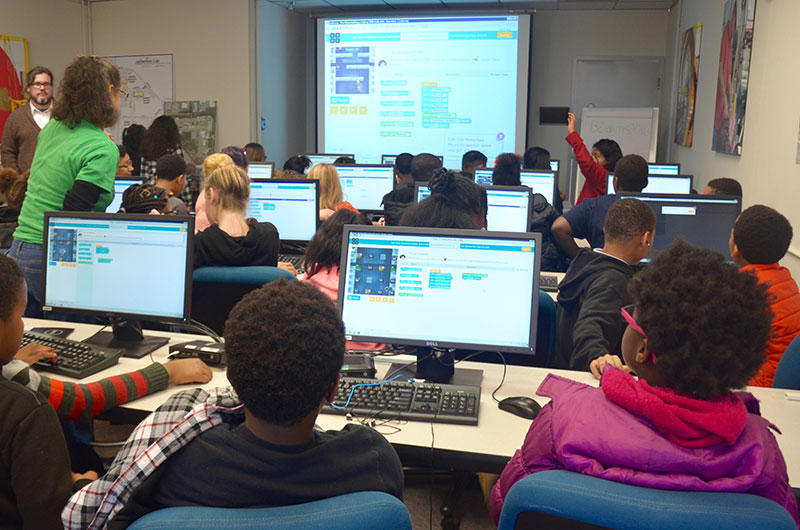Volunteers from Jefferson Lab’s Information Technology Division and Science Education staff recently joined forces to provide more than 60 local students with the opportunity to experience basic computer programming during Computer Science Education Week.
Campaign Raises Student Awareness of Computer Science Career Opportunities
NEWPORT NEWS, VA – To help raise awareness of the need for digital literacy, volunteers from Jefferson Lab’s Information Technology Division and Science Education staff joined forces in December to provide more than 60 local students with the opportunity to experience basic computer programming.
Two classes of fifth-grade students from Carver Elementary School – participating in Jefferson Lab’s BEAMS program – were invited to participate in the lab’s Hour of Code campaign during the 2016 Computer Science Education Week. The purpose of the campaign is to encourage students, and their parents and teachers to participate in and to learn more about computer programming and the many career opportunities in the field of computer science.
BEAMS, or Becoming Enthusiastic About Math and Science, is the lab’s long-running, hands-on, activities-driven program for fifth and sixth graders.
The theme for the lab’s Hour of Code activity was Star Wars. Students learned programming basics in order to develop an animated computer game by using a drag-and-drop block system, according to Lisa Surles-Law, Education administrator. “Students navigated through various levels of coding instructions to make their character complete a range of tasks – like walking, avoiding obstacles and removing or avoiding threats,” she explained. “For most of the students, this was their first time learning about coding.
“The students really enjoyed the sense of accomplishment they got out of achieving a programming goal,” Surles-Law observed. “They really took to the activity. Many of them asked for more games to work on.
“The teachers were delighted by the students’ interest in programming and said they would try to give their classes more time to explore these learning opportunities,” she continued.
“Our IT Division volunteers were wonderful; they were great role models. They helped the students troubleshoot problems and with working through some of the more complex tasks. They shared their love for programming and answered questions about their careers and their duties at Jefferson Lab,” she added. “The volunteers helped connect the dots between what the students were doing in the coding activity to what they do in their daily jobs.”
IT Division volunteers included Amber Boehnlein, Kurt Strosahl, Kari Heffner, Dana Cochran and Bobby Lawrence.
This was the lab’s second year participating in the Hour of Code campaign.
Amber Boehnlein, physicist and the head of Jefferson Lab’s IT Division, introduced the lab to the Hour of Code initiative in 2015, after learning about it from a colleague. “It sounded like a great event and a really fun way to demystify computer programming for students,” she recalled. “This is an important skill for students to be aware of; it shows them how to structure a program and why algorithm development is necessary. They learn to apply what they’ve studied in math class. And ‘gamefying’ coding makes it fun; students can immediately see their results. It is empowering.
“Anybody can learn to program. It is fun,” she added. “This is a fantastic way to enable the technology and foster career interests. All you need is a computer and a browser. It is something parents can do with their kids over holiday breaks or any time.”
A coalition of technology leaders, businesses, organizations and academic institutions developed the Hour of Code campaign through a public nonprofit (Code.org), which is dedicated to “expanding participation in computer science by making it available in more schools and increasing participation by women and underrepresented students of color.”
Nearly every aspect of life is now impacted by computers and the use of computerized devices. The proponents of Hour of Code believe that it is important for students to have at least a basic understanding of how computers work and that every student should have the opportunity to learn computer science. The goals are to help nurture problem-solving skills, logic and creativity and open up 21st-century opportunities and career paths.
Contact: Deb Magaldi, magaldi@jlab.org
Ph. 757-269-5102


